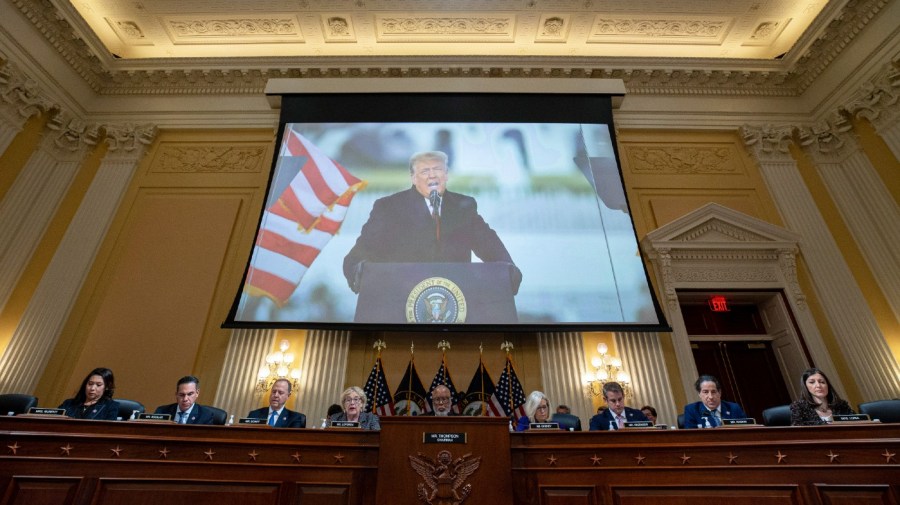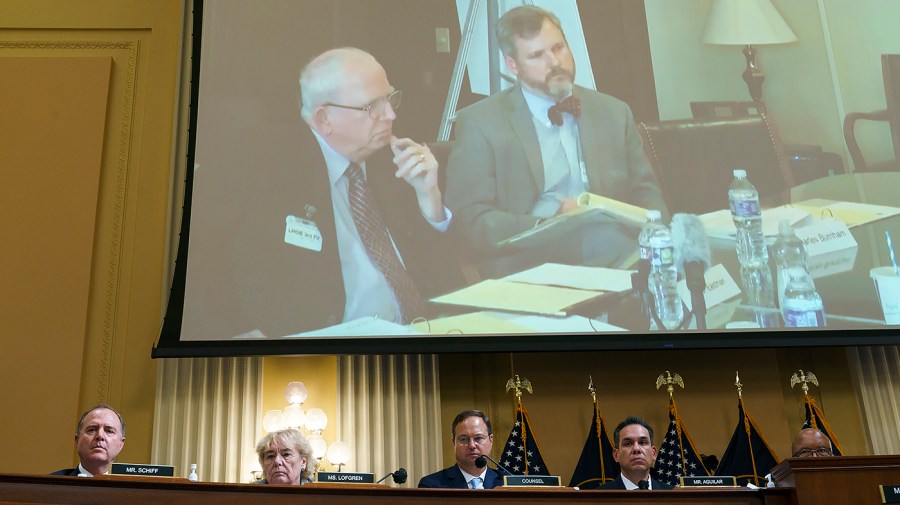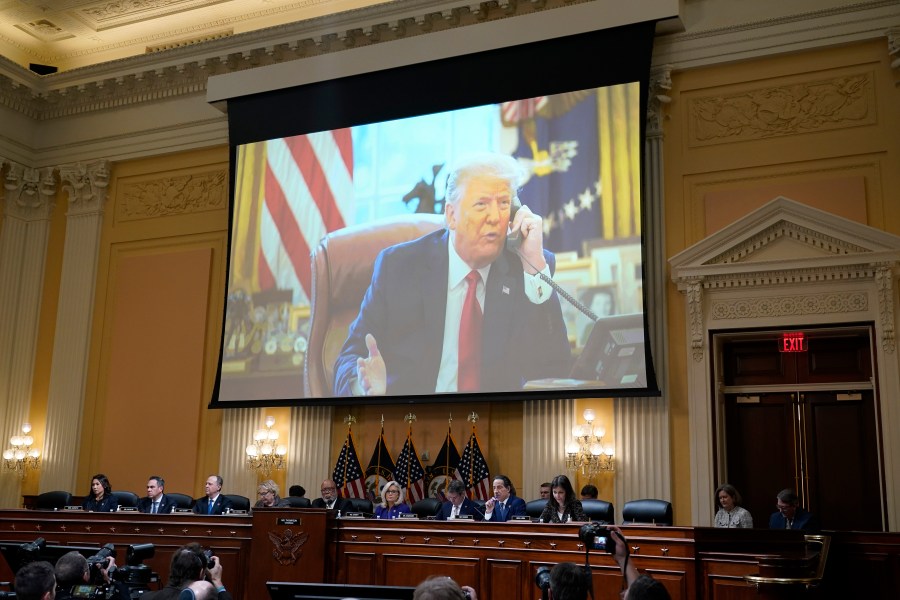What the Jan. 6 panel cited for each criminal referral against Trump
The House select committee investigating the Jan. 6, 2021, attack on the Capitol referred former President Trump to the Justice Department on four separate charges Monday, marking a momentous step in the panel’s year-plus probe of the Capitol riot.
The panel recommended that the Justice Department investigate Trump for inciting, assisting, or aiding and comforting an insurrection; obstructing an official proceeding; conspiracy to defraud the United States; and conspiracy to make a false statement.
The referrals, while significant, are largely symbolic in nature because the Justice Department is not obliged to take up recommendations from the committee. It remains to be seen if the agency will go down that path.
The committee said it based its referrals on “sufficient evidence” showing that Trump violated the statutes listed. Here is what the committee said to back up each charge:
Inciting, assisting, or aiding and comforting an insurrection

- Despite knowing then-Vice President Mike Pence did not have the legal authority to stop the certification of the election, Trump told his supporters on the Ellipse on Jan. 6 that if Pence “comes through for us” he could deliver a win for Trump, adding, “If Mike Pence does the right thing, we win the election,” according to the committee.
- Trump tweeted at 2:24 p.m. on Jan. 6 that Pence “didn’t have the courage to do what should have been done to protect our Country and our Constitution.”
- Trump “refused to condemn the violence or encourage the crowd to disperse” during the riot, despite his staff and family repeatedly asking that he do so, and “did not want to provide security assistance to the Capitol during that violent period,” the panel wrote.
- Then-White House chief of staff Mark Meadows told White House counsel Pat Cipollone that Trump did not want to do anything to stop the violence. And when House Minority Leader Kevin McCarthy (R-Calif.) asked Trump to tell his supporters to leave the Capitol, the president responded, “Well, Kevin, I guess these people are more upset about the election than you are,” according to the executive summary.
- When Trump was told that the crowd was chanting, “Hang Mike Pence,” the president “responded that perhaps the Vice President deserved to be hanged,” according to the committee.
- One person who pleaded guilty to threatening Speaker Nancy Pelosi (D-Calif.) texted a family member on Jan. 6 saying that the president “wants heads and I’m going to deliver.” Another defendant, in a statement through an attorney, said, “I was in Washington, DC on January 6, 2021, because I believed I was following the instructions of former President Trump and he was my President and the commander-in-chief. His statement also had me believing the election was stolen from him.”
Obstruction of an official proceeding

- John Eastman, a conservative lawyer and informal Trump adviser, admitted in an email exchange during the Capitol riot that Trump was “advised” that Pence could not lawfully decline to tally votes under the Electoral Count Act but noted that “once he gets something in his head, it’s hard to get him to change course.”
- Trump was aware that he lost state and federal lawsuits, and he knew that the Justice Department, his campaign and other advisers did not find enough fraud that would change the results of the election, according to the committee. And he knew that no state legislative majorities “had taken or manifested any intention to take an official action that could change a State’s electoral college votes,” according to the executive summary.
- The committee said Trump’s plans to persuade state legislatures, officials and others to change official electoral results “provides further evidence that President Trump was attempting through multiple means to corruptly obstruct, impede or influence the counting of electoral votes on January 6th.”
- Jeffrey Clark and another Trump Justice Department political appointee drafted a letter for the Georgia legislature that was meant to help urge a state legislature to alter its slate of Electoral College electors based on incorrect claims of fraud so Pence “could unilaterally and unlawfully decide to count a different slate on January 6th.” Cipollone said the letter was “a murder-suicide pact,” and other officials from the Justice Department and White House described it in a similar manner.
- The panel claimed that Trump “was responsible for recruiting tens of thousands of his supporters to Washington for January 6th, and knowing they were angry and some were armed, instructing them to march to the Capitol and ‘fight like hell.’”
- Trump, for several hours, refused to take steps to stop the violence despite knowing what was happening at the Capitol, the panel said.
Conspiracy to defraud the United States

- Trump entered into agreements, formal or informal, with individuals who aided his plan to hinder the certification of the Electoral College results, according to the committee.
- Clark made an agreement with Trump that if he were appointed acting attorney general, he would send a letter to state officials that incorrectly said the Justice Department believed the state-level personnel had an adequate factual foundation to convene and pick new electors. The Justice Department, however, had already concluded that there was no factual basis to argue that the election had been stolen, according to the executive summary.
- The panel said conspirators utilized “deceitful or dishonest means.” Trump allegedly lied a number of times about the election, despite being informed by advisors that there was not sufficient evidence of fraud that would alter the results of the election.
- Trump insisted that Georgia Secretary of State Brad Raffensperger “find” him 11,780 votes, despite the state official saying he did not have the authority to do so.
Conspiracy to make a false statement

- Individuals the committee said were acting at Trump’s behest submitted fake slates of electors to Congress and the National Archives.
- The panel said Trump “relied on the existence of those fake electors as a basis for asserting that the Vice President could reject or delay certification of the Biden electors.”
- The committee further argued that Trump “personally participated in a scheme to have the Trump electors meet, cast votes, and send their votes to the Joint Session of Congress in several states that Vice President Biden won, and then his supporters relied on the existence of these fake electors as part of their effort to obstruct the Joint Session.”
–Updated on Dec. 20 at 10:34 a.m.
Copyright 2023 Nexstar Media Inc. All rights reserved. This material may not be published, broadcast, rewritten, or redistributed.

